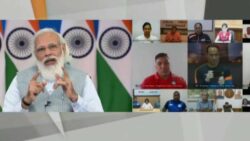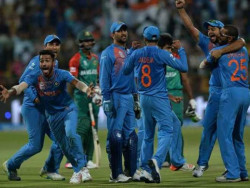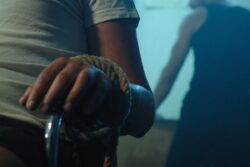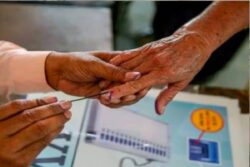Olympics 2012: Sushil Kumar, Yogeshwar Dutt provide late spark as India scale a historic high
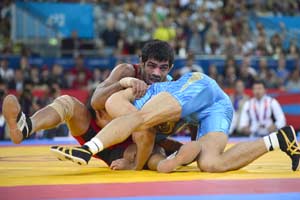
London: Sushil Kumar’s historic feat of winning back-to-back Olympic medals on the very last day here undoubtedly turned out to be the high point of the country’s campaign as the biggest-ever Indian contingent completed the 30th edition of the Games with a record haul of six medals.
 The wrestlers provided the late sparks to the Indian campaign with Sushil’s silver medal in the 66kg category and bronze through Yogeshwar Dutt (60kg) that went a long way in overshadowing the flop show of some of the other star players.
The wrestlers provided the late sparks to the Indian campaign with Sushil’s silver medal in the 66kg category and bronze through Yogeshwar Dutt (60kg) that went a long way in overshadowing the flop show of some of the other star players.
In the end, India did live up to the expectation as six medals is something that was being spoken about by commentators when the contingent embarked for the Games. It was a far better show than the one gold and two bronze medals that India won at the Beijing Olympics four years ago.
Yet, there was a feeling that India may fall short of the target till the last two days of the Games when the wrestlers changed the script with their stunning display on the mat.
Sushil, a bronze medal winner in Beijing, emerged as the hero with his effort. For long, Indian sportspersons had been confined to mediocrity and were just making up the numbers in the Olympic Games and it was a refreshing change to see individual medals coming their way.
Abhinav Bindra’s gold medal in Beijing was a landmark and a real confidence booster four years ago.
Yogeshwar’s bronze medal was also a stupendous feat considering the fact that he bounced back brilliantly after losing his 60kg quarterfinal bout and worked his way to the bronze through the repechage stage. He showed tremendous stamina, skill and strength to overcome all odds.
Apart from the exploits of the wrestlers, shooter Vijay Kumar clinched the silver medal in the 25m Rapid Fire event, while five-time world women’s boxing champion M C Mary Kom, ace shuttler Saina Nehwal and rifle shooter Gagan Narang won bronze medals each.
But, there were disappointments galore and it came more from the star athletes who were said to have realistic chances of winning medals. But sadly, most of them flopped.
The big names like shooters Abhinav Bindra and Ronjan Sodhi, archer Deepika Kumari and Beijing bronze medallist boxer Vijender Singh returned empty-handed. All of them were serious medal contenders.
The much-hyped men’s hockey players were the worst offenders as they lost all their six matches to finish 12th and last, the worst-ever performance in the history of the Games if one overlooks the country’s failure to even make it to the 2008 Olympics.
The archers too were major let-downs. They went into the Olympics with good form behind them and the men’s team had even qualified for the Olympics with a good show.
But when the moment came, they simply crumbled with none of them performing to potential. True, the windy, cold and cloudy conditions here did not suit them but then they had trained well taking into consideration all these factors.
A pre-competition bout of fever to the archers was attributed as the main reason for their poor show. Most of the archers trotted out that excuse after their events.
The lowest point in achery came when Deepika, the world number one, crashed out in the very first round of the women’s individual recurve. It was a shocker for the Indian camp.
Talking about shocks, nothing, however can be bigger than the bottom place finish of the men’s hockey team after losing 2-3 to South Africa in the 11-12 classification match.
Never in the history of Indian hockey has a team finished last in the Olympics, an 8th finish in the Atlanta Olympic Games being their worst show before the London debacle.
The Indian team lost all their group league matches, some of them quite badly, and it seemed that the gap with other international teams had widened over the last few weeks.
In the days to come, analysts and experts will come out with various reasons on why the Indian team failed but the bottomline is that the players were simply not good enough and what they dished out was absolute pedestrian stuff.
The embrarrasing result will also raise a debate on whether Australian Michael Nobbs, who had promised to revive Indian hockey, would be sent packing as the coach like so many of his predecessors — Jose Brasa, Gerhard Rach and Ric Charlesworth.
It may not be fair to fully blame Nobbs for the disaster. The players were simply not implementing the plans and it is hard to explain why.
If the strikers were thoroughly ineffective and more interested in playing individually, the midfield and defence also left much to be desired. Only Sardar Singh played his heart out and gave a good account of himself match after match, but hockey is not an individual game. Just one man cannot carry the team.
It will be interesting to see how Hockey India reacts to the debacle. Many of the players appear to be past their prime. But with no replacements readily available at the junior level and many other top players taking part in the rebel league, their options are limited.
There was a huge expectation from the Indian shooters when they left but perhaps the hype was a trifle misplaced as the biggest ever shooting contingent returned with just a silver and a bronze.
The big names of Indian shooting did not quite live up to reputation and the form deserted them when it mattered the most, as a result, India just won two medals even as they hoped for a bigger haul.
The unheralded Vijay Kumar emerged as the hero with his silver medal in the men’s 25m rapid fire pistol, while Narang bagged a bronze in the men’s 10m air rifle event.
Apart from these two medal winning effort, Joydeep Karmakar put in a creditable performance in the 50m rifle prone as he missed the bronze medal by a whisker to take the fourth position.
It was a heart-warming performance by Karmakar in his very first Olympics, made all the more creditable since many of his other fancied teammates flopped.
When the team left the Indian shores, Beijing Games gold medallist Bindra, Narang and Sodhi were touted as serious medal contenders and the media was talking about an unprecedented hall of medals from the shooting ranges at the Royal Artillery Barracks. While Narang managed a bronze, Bindra and Sodhi turned in disappointing performances to dent their medal prospects.
On the whole, it again proved that Indian shooters, despite having improved vastly over the years, lacked the confidence and the composure to do well in the biggest sporting stage.
Although they have good track records, they just could not hold their nerves and many of them got overawed by the situation and succumbed to pressure.
None of the women shooters could really make much of an impression.
Heena Siddhu, known for her consistency, was expected to do better than what she did, finishing 12th in qualification round for 10m air pistol, while Rahi Sarnobat took the 11th position in the 25m air pistol qualification.
The boxing ring was expected to give India a few medals, but a bronze from Mary Kom was all that came their way.
There was a lot of hype surrounding the boxers when they left for the Games amid high hopes of winning a few medals, so the results will no doubt come as a huge let down with all the male boxers returning empty-handed.
The 29-year-old Mary was the saving grace for the contingent as she clinched a historic bronze in women’s boxing that has been introduced in the Olympics for the first time.
Mary, who generally fights in the 48kg category, had to increase her body weight to take part in the women’s 51kg category and did put up a sterling show against boxers who were much taller and heavier than her.
But the seven male boxers could not go beyond the quarterfinal stage and the Indians claimed that many of them were at the receiving end of some dubious judgements.
Although some of the Indian boxers were distinctly unlucky, it was not always the reason for their defeats. Clearly, they were technically not as sharp as their rivals.
Beijing bronze medallist Vijender was hoping to become the first Indian to bag back-to-back Olympic medal but he lost to Uzbekistan’s Abbos Atoev 17-13 in the quarterfinals.
Atoev was clearly a superior boxer and the Indian needed a huge slice of inspiration to pull it off but it didn’t happen.
The young Devendro Singh was the only other pugilist to make enter the quarters where he fought bravely before going down to Paddy Barnes of Ireland in a contest marred by debatable refreeing.
The Indian camp was understandably quite peeved by the refereeing in many of the bouts involving Indian boxers.
In badminton, a historic bronze medal for India in Olympics was not something that many had bargained for when the Indian shuttlers began the competitions.
Though Saina Nehwal was regarded as a medal contender, many had doubts on whether she could break the Chinese stranglehold to actually win a medal for the country.
The bronze medal for the Hyderabadi ace came under fortuitous circumstances when the world no 2 Chinese Xin Wang retired due to a knee injury just at the start of the second game, giving India its first ever Olympic medal in badminton.
The debate will always continue whether Saina, who was trailing 18-21, 0-1 when Wang conceded the match, could have actually prevailed over her strong Chinese opponent if the match had gone the distance.
Saina reckons that she could have pulled it off as the Chinese was getting tired and she was beginning to find her rhythm midway through the first set.
But all said and done, it is a historic medal for India and as Saina herself suggests, could change the badminton scenario in the country, which has struggled to find players of international quality for long.
Apart from Saina’s bronze, another quiet and shy Indian, Parupalli Kashyap also made a mark by becoming the first Indian male to reach the quarterfinal stage of the Olympics.
Not many had expected Kashyap to set the badminton arena on fire, so his performance to secure a place in the quarterfinals was highly creditable.
Though other shuttlers, Jwala Gutta, V Diju and Ashwini Ponappa, could not really make any impact, failing to enter quarterfinal knockout stage in their respective team events.
Jwala and Ashwini featured in the women’s doubles event and were distinctly unlucky not to make the knockout stages, missing out by just one difference point.
Tennis was another event in which the Indians failed, expectedly so after all the public bickering over selections ahead of the Olympic Games.
When it was the time to perform, the Indians came up with a disappointing show. Most of the teams lasted only till the second round, except for the pair of Paes and Sania Mirza who progressed till the quarterfinals in the mixed doubles.
Perhaps the biggest disappointment was Mahesh Bhupathi, who looked off colour and was found wanting in many areas. Clearly, the onus was on Bhupathi and Rohan Bopanna to deliver as they got the team they wanted and were seeded seventh in the men’s doubles.
The Indian duo won the first match against Max Mirnyi and Alexander Bury of Belarus in a three-set marathon tussle, which lasted two hours and 26 minutes. But the euphoria of winning the first round was shortlived as they lost to Richard Gasquet and Julien Benneteau in another three-setter contest in the second round.
Paes and Vishnu Vardhan also won their first round match but found Jo Wilfred Tsonga and Michael Llodra of France, the strong combination, too hot to handle in the second round.
With the elimination of the doubles duo, the focus shifted to Paes and Sania in the mixed doubles. They won the first round against Nenad Zimonic and Ana Ivanovic of Serbia with a clinical display, raising hopes of a medal. But they could not go past the pair of Max Mirnyi and Victoria Azarenka of Belarus in the quarterfinals, bringing an end to the Indian challenge in the tennis competitions.
In the men’s singles event, Somdev Devvarman and Vardhan, who got a wild card in the 11th hour, fell by the wayside in the first round itself.
There was no noteworthy performance from the Indian camp in the showpiece athletic event, not that anyone expected, but some of the athletes even fail to reach their personal best.
Krishna Poonia qualified for the final of the women’s discus throw final and Vikas Gowda also did the same in the men’s discus throw. But in the final, Vikas finished 8th and Poonia finished seventh.
Poonia could only hurl the discus to a distance of 63.62m, well below her personal best of 64.76m, also a national record. She was subdued throughout the competition.
Gowda began on a promising note with a near 65m mark — a 64.79m throw — but eventually fizzled out without any semblance of fight.
Triple jumper Renjith Maheshawary astonished everyone as he fouled in all his three to record “no mark”, making a complete mockery of his Olympic participation.
The young Indian paddlers, Soumyajit Ghosh and Ankita Das also failed miserably, while in judo, Garima Choudhury lost her first round contest. The rowers also could not create any ripples.

